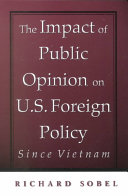
The Impact of Public Opinion on U.S. Foreign Policy Since Vietnam
By - Sobel, Richard (Writer on national security)
Floor
-
Floor 1
Published
-
Oxford University Press, New York, 2001
ISBN 10 - 0195105281
ISBN 13 - 9780195105285
Book Status
-
1 Qnty Available with us.
Subject
-
Public opinion
Shelf No
-
15
Call Number
-
327.73 SOB
Physical Description
-
XII, 276 Seiten
Notes
-
Include Bibliography and index.